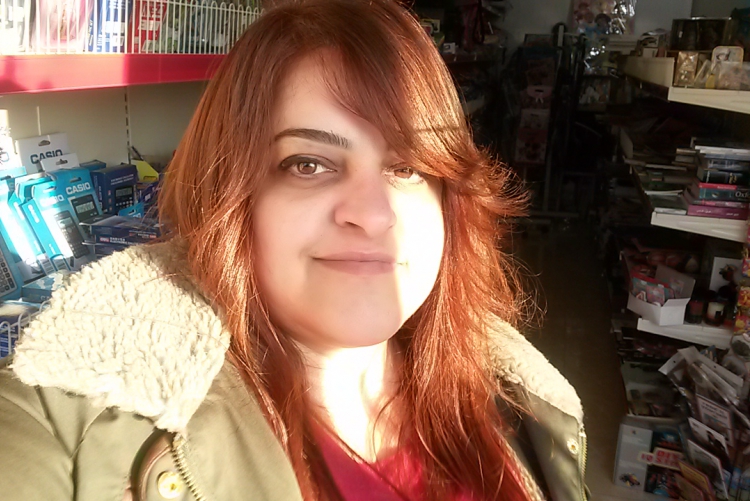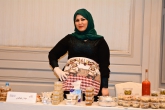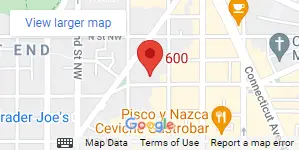In 2014, AWEP was offered in Egypt, Jordan, Lebanon, and Morocco. This year, AWEP training rounds are taking place in Iraq, Jordan, Lebanon, and Morocco. The results are paying off! Here are just a few of the stories of these impressive women.
Nadine Issa, Lebanon
Nadine Issa has always been passionate about reading and nurtured the dream of opening her own bookstore since she was young. In September 2014, upon completion of her participation in AWEP, she opened Azazeel bookstore in her hometown of Deir Zahrani in south Lebanon. In addition to selling books and magazines, Azazeel sells stationary and gifts, and Nadine assists students with online research.
The local community has welcomed the new bookstore, and its client base is steadily increasing. AWEP taught Nadine to use customer data to grow her business. She now sends her clients regular updates on new products via “SMS” campaigns and maintains a Facebook page that helps her connect to them.
Within the first six months of operation, the bookstore became profitable. In the future, Nadine hopes to add a coffee shop, Internet zone, and an area for meetings and lectures. She also hopes to one day be able to help independent authors print and distribute their novels.
“AWEP gave me the confidence to believe in my dream and pursue the opportunity I saw,” Nadine asserts. “I learned to love accounting and how to deal with different types of customers, among many other new skills. AWEP helped me transition from a passionate reader to a bookstore owner.”
Dina Zabalawi, Jordan
Dina Zabalawi's upbringing was not without challenges and, although encouraged by Al Aman Fund for the Future of Orphans to apply to AWEP, she came into the program unsure of her convictions, afraid that they might be rejected. But her experiences in the project and the positive response of her fellow AWEP members helped her gain confidence in her plan for a business that promotes healthy, wholesome foods. She has registered the trade name for her business and attracted the interest of several investors.
AWEP’s reliance on peer support and networking helped her develop self-confidence; despite being a decade younger than many of her fellow participants, she emerged as one of the group’s leaders. Most important, AWEP helped her connect with a restaurant owner who shares her ideas. With his support, she now is in a position to develop and implement her ideas of promoting healthy meals, potentially regionwide. “My experience in AWEP made a difference in my ability to launch my business,” Dina asserts with confidence.
Rawanda Baalbaki, Lebanon
Since she was a child, Rawanda Baalbaki dreamed of becoming an accessory designer. Discouraged by her parents, she eventually studied law and political science but never gave up on her dream. She became a loyal and devoted employee, but felt no true passion for the jobs she held and often dreaded going to work. In April 2011, she decided it was finally time to pursue her dreams and start her own business selling hand-made accessories.
Without any startup capital, Rawanda started by participating in different exhibitions. By mid-2012, she had saved enough money to be able to rent a small shop, but shortly after opening it, her grandfather fell ill and she had to dedicate most of her time to caring for him. By early 2013, she was finally able to focus on her own business. Her family still did not support her entrepreneurial dream, but Rawanda persisted.
Initially she focused on building and retaining a solid customer base by offering her clients quality products and first-rate service. As she had never had any type of business training, she applied for AWEP. AWEP taught her how to build her business step-by-step. She learned key skills, including how to register her business, handle the accounts, manage cash flow, deal with problems, manage her Facebook page, and advertise on Facebook. AWEP also helped build her self-confidence and motivated her further. She befriended her fellow participants, who connected her to new customers, and one of the other participants displayed her products in her beauty salon.
Since her participation in AWEP, Rawanda has expanded the customer base of her Beirut shop to include clients from all over Lebanon. A seventy percent increase in her income also has her thinking of renting a larger shop in a better location. By purchasing a few machines that can perform jobs she currently outsources, she’s now thinking of inviting others to outsource their jobs to her.
Rawanda’s experience has convinced her that AWEP can help other women like her. “AWEP is a wonderful program that can help any woman realize her entrepreneurial dreams,” she offers enthusiastically.




